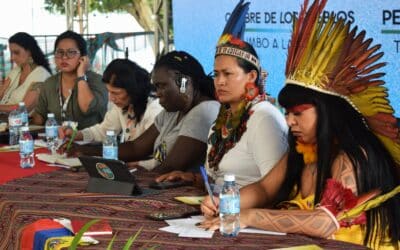by Rachel Smolker, Biofuelwatch, USA
Lea el informe completo: Swallowing Indonesia’s Forests
El gobierno de Indonesia anunció recientemente planes para varios nuevos proyectos de “propiedades alimentarias” en las provincias de Kalimantan Central, Papua y Sumatra del Norte. Estos proyectos afectarían a cientos de miles de hectáreas de tierra, incluidas algunas de las últimas áreas de bosques tropicales prístinos del mundo que quedan en la región, para la tala y la conversión.
Continuar leyendo en inglés…
Past experience with food estate projects (the “Mega Rice” project and the “Merauke Integrated Food and Energy Estate”) proved to be a social and environmental disaster, displacing communities, producing little food and resulting in more rather than less hunger, and leaving vast swathes of previously forested land denuded and smoldering with peat fires that polluted air across continents.
Who benefitted? Those who profited from the sale of timber followed by the establishment of palm oil and other export commodity crops. The new food estate proposals are framed as a response to the economic impacts of COVID-19 and food insecurity, but in reality they are opportunistic land grabs aimed to further pad the bloated coffers of a few corrupt individuals at the expense of people and the planet.
With the implementation of the food estates partially under the authority of the ministry of defense, the displacement of communities and threats of violence are commonplace, and resistance often life-threatening. Indonesia’s people deserve to be safe, to enjoy food sovereignty, to be consulted about their lands, and treated with respect. The governments’ proposed food estate programs will do none of the above.
Our planet is in crisis. Deforestation and ecosystem degradation, pollution and loss of biodiversity, and the impoverishment of peoples and places leaves us faced with dire predictions for the future. Meanwhile, international agreements including the Sustainable Development Goals, the Aichi targets, the UN Declaration on the Rights of Indigenous Peoples, and international agreements on climate and biodiversity, all will be rendered meaningless and blatantly violated if Indonesia proceeds with stated plans for more “food estate” disasters. The international community cannot abide by these proposals. Banks and potential investors must act responsibly to reject Indonesia’s thinly veiled plans for escalated destruction of her forests and her peoples.




